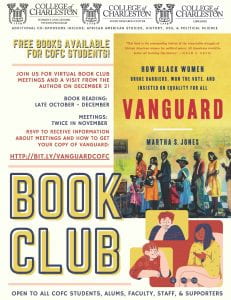 Septima Clark Auditorium (Room 118)
Septima Clark Auditorium (Room 118)
Thaddeus Street Jr. Education Center
25 St. Philip St, Charleston, SC 29401
Tuesday, March 28, 7:30 pm – 9:00 pm
The recently unveiled mural of Septima P. Clark in the Education Center at the College of Charleston will serve as a backdrop for a March 28 conversation on the civil rights icon’s life and legacy. A 7:30 p.m. panel discussion at the center will include five contributors to the book “Ukweli: Searching for Healing Truth” and an archivist from the college’s Avery Research Center for African American History and Culture. Ukweli is a collection of essays and poems on the Black experience in America. Georgetown artist Natalie Daise created the 7-foot-high by 30-foot-long mural, “Saint Septima with Carolina Jasmine” in the center’s Septima P. Clark Memorial Auditorium. Unveiled on Feb. 23 in the auditorium’s foyer, the mural features Clark’s portrait in profile and a quote from a 1970 speech: “I believe unconditionally in the ability of people to respond when they are told the truth. We need to be taught to study rather than to believe, to inquire rather than to affirm.
Ukweli, is the Swahili word for truth. The book follows a 2020 poetry-lecture series at McLeod Plantation organized by poet Horace Mungin. He passed away before Ukweli was released in February 2022. The book is a collection of essays and poems from 49 contributors, including Mungin and co-editor Herb Frazier. Ukweli contributors Millicent Brown, LaTisha Vaugh and Karen Meadows will discuss their Ukweli essays and Clark’s legacy.
Brown is co-founder and project director of an oral history initiative to identify the “first children,” like herself, to desegregate previously all-white schools. LaTishais co-founder of E3: Educate, Empower, Elevate LLC, an organization that focuses on equitable outcomes for Black and brown children and families. Meadows, a high school counselor in Guilford County Schools, is an adjunct professor at the University of North Carolina at Charlotte. Avery’s archivist Georgette Mayo will join them. Avery holds Clark’s personal papers.
Savannah Frierson, a Ukweli contributor and Avery’s office manager, will moderate the session. She and Marjory Wentworth, also a Ukweli contributor, will open and close the panel with Mungin’s poems from Ukweli. Wentworth teaches at the College of Charleston.
The event also provides an opportunity to premier a video that honors Mungin’s contributions to poetry and social activism. Charlotte filmmaker Steve Rutherford produced the seven-minute video as a tribute to Mungin, who started writing poetry in the mid-sixties during the genesis of the Black Arts Movement.
In addition to the Septima P. Clark mural, information panels in the Education Center present the periods of Clark’s life. Essays, interviews and a range of primary sources represent the online material the college has posted to tell Clark’s story as an educator and civil rights champion who Martin Luther King Jr. called the mother of the movement.
 Septima Clark Auditorium (Room 118)
Septima Clark Auditorium (Room 118)



